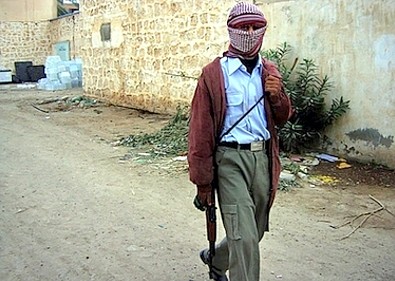Perspective: Sunni Muslims increasingly look for American troops to shield them

A policeman patrols in Ramadi in Iraq's Anbar province
BAGHDAD, Iraq -In a swirl of business suits and elegant robes, a delegation of community leaders from Iraq's most rebellious province slinked into a Baghdad hotel Saturday to give a news conference arranged by American handlers.
One sheikh promptly hid behind a door. Another insisted that not even his voice be recorded. With obvious reluctance, just three of the Sunni Muslim leaders agreed to speak on camera about the purpose of their visit: an unusual request for U.S. protection against attacks by Shiite militias and security forces.
The palpable discomfort among the delegates from Anbar province, home to the insurgent-infested towns of Ramadi and Fallujah, reflects a line from page 15 of the bipartisan Iraq Study Group's report on the war: "Sunnis are confronted by paradoxes: they have opposed the presence of U.S. forces in Iraq but need those forces to protect them against Shia militias."
It's a humbling dilemma for a proud minority.
Iraq's Sunni Arabs, the backbone of the anti-American insurgency, continue to issue vehement calls for the withdrawal of U.S. forces from Iraq. Privately, however, many of them describe American troops as the only reliable buffer between Sunni Arab enclaves and the Shiite-led government's militia-ridden security forces.
Now, even Sunni tribesmen accused of supporting attacks against American troops are taking U.S.-chauffeured helicopter rides to meet with officials in the fortress-like U.S. and Iraqi headquarters known as the Green Zone. Americans escorted the Anbar leaders to the Rasheed Hotel, where visitors in Saddam Hussein's era stepped on an inlaid mosaic of the elder President Bush's face as they entered.
"We trust only Sunni security forces and they must be supported by the Americans. We must have our Sunni police and army that the Americans must build and support," said Falih al Dulaimi, an Anbar councilman.
Read the rest at Real Cities

<< Home